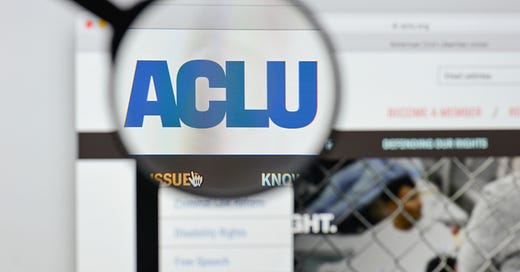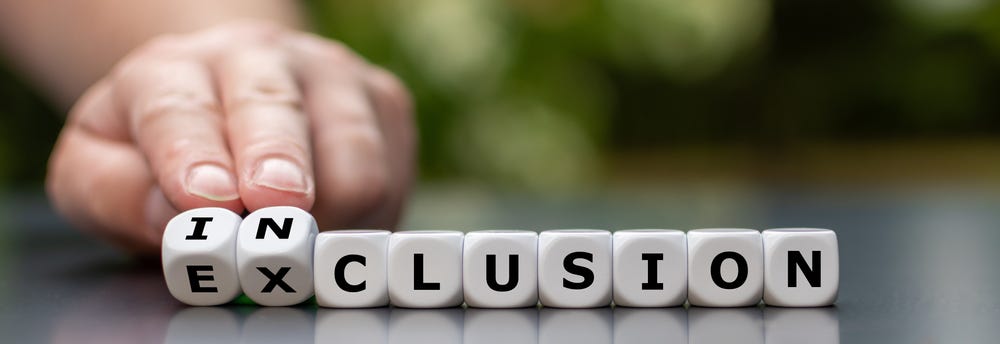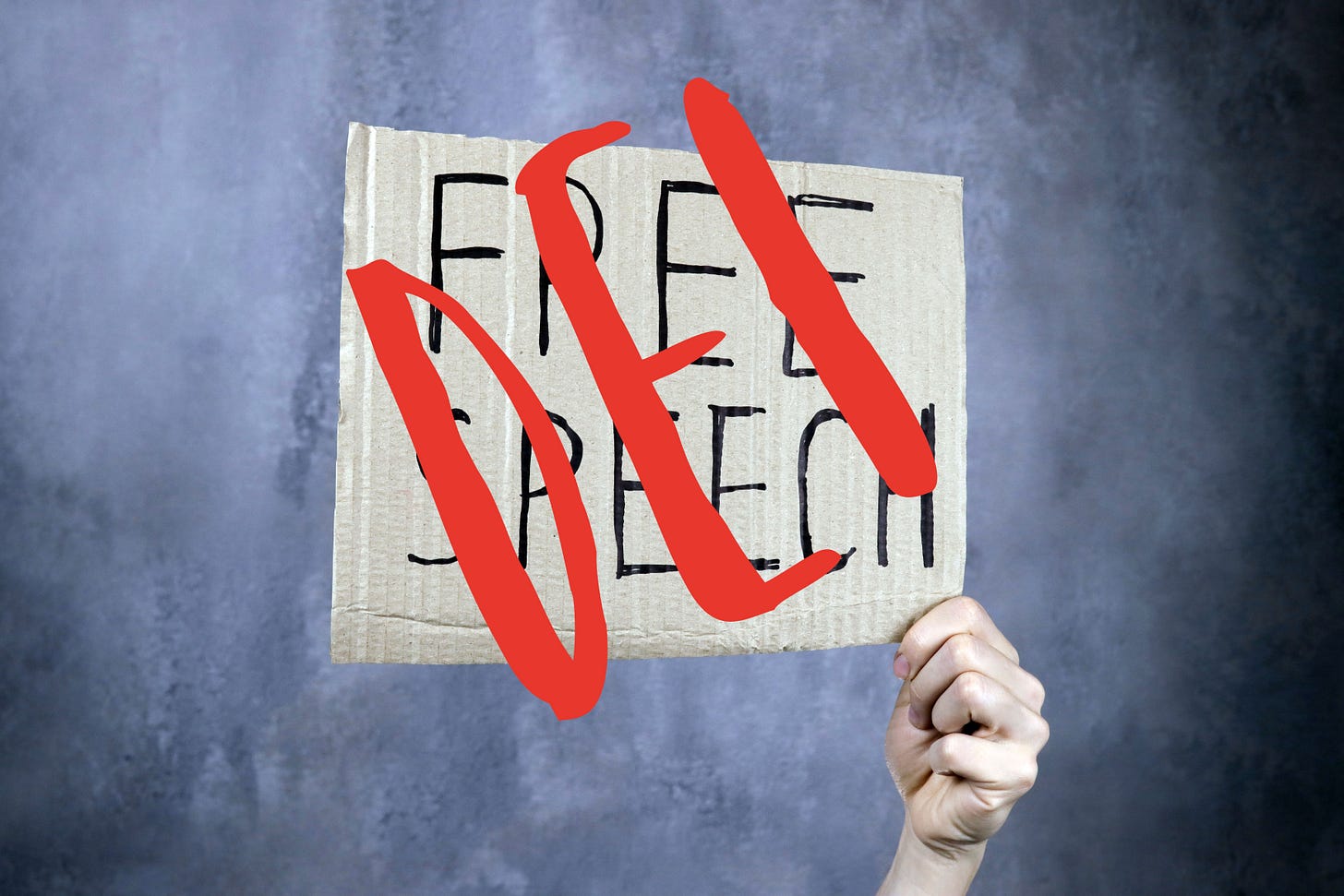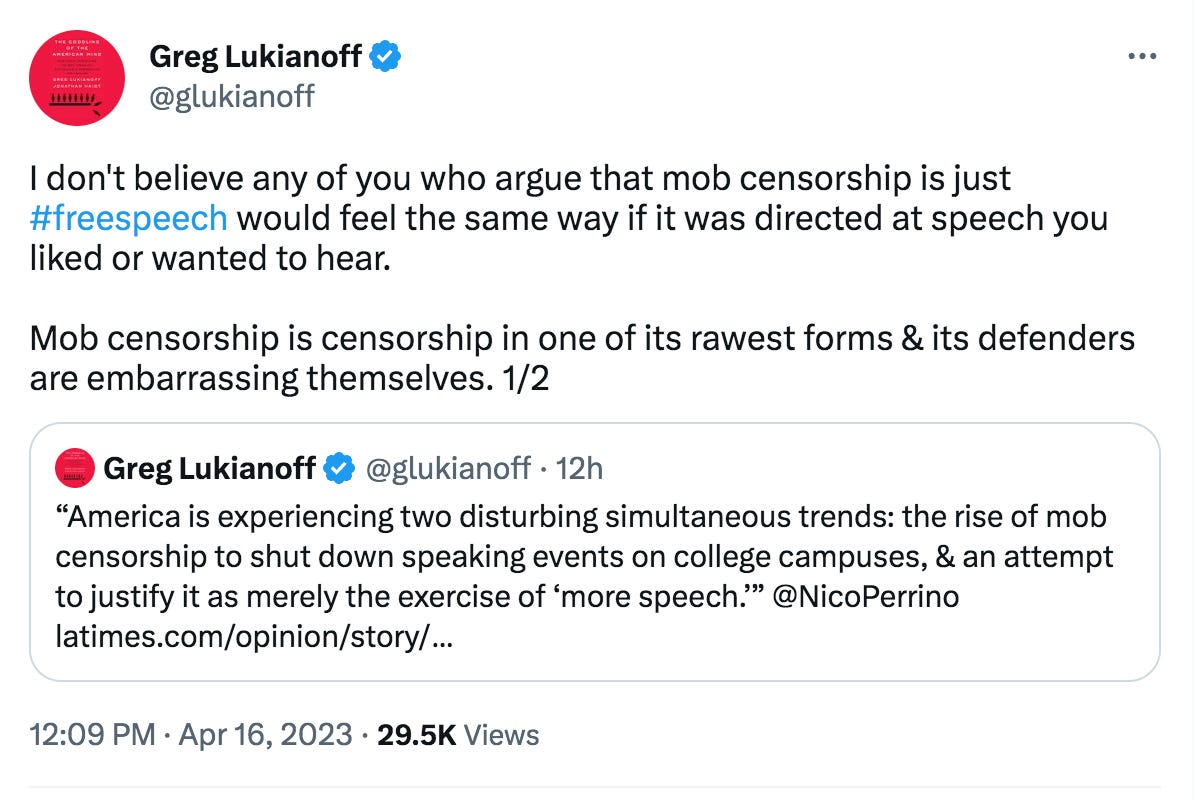E-Pluribus | April 17, 2023
DEI in, CIE out; civil liberties deserve better than the ACLU; and DEI in, CIE out, part two.
A round-up of the latest and best writing and musings on the rise of illiberalism in the public discourse:
Tal Fortgang: Conformity, Inequity, and Exclusion
CIE may not be as recognizable as DEI, but Tal Fortgang at National Review writes that policies meant to foment diversity, equity, and inclusion and more likely to generate just the opposite. Fortgang cites the behaviour of both students and Stanford’s DEI administrator to support his thesis.
[DEI, diversity, equity, and inclusion] is predicated upon contestable progressive assumptions and a thoroughly left-wing worldview that make it incompatible with the proper practice of law. As long as DEI remains a part of higher-education administration, universities will be systemically biased against conservatives, or anyone unsure of today’s trendy orthodoxies.
To see just how the practice of DEI and its most basic principles undermine these commitments to free speech and academic freedom, all we need to do is look at how DEI concepts are wielded by people trained to implement them. We need consider no more than Steinbach’s words, prepared in advance with the goal of bringing the full weight of the DEI concept-world down on Judge Duncan and his Federalist Society hosts.
In her now-infamous refrain “Is the juice worth the squeeze?” Steinbach rhetorically asked whether Judge Duncan had something so important to say that it was worth the “harm” his presence caused Stanford Law students. But to focus only on free-speech implications and pillory Steinbach accordingly is to forget that this question is often a good one. A stable, free society allows and even encourages citizens to ask themselves whether exercising their right to speak freely at a given moment, in a given way, is beneficial or harmful to those around them. Sometimes a legally protected act of expression can be bad; burning an American flag, yelling one’s hope for rape against a fellow citizen’s family, and Sieg Heil-ing all tear at our social fabric and detract from our ability to live together peaceably.
Yet in this instance Steinbach deployed the metaphor before Duncan had said anything substantive, and with no indication that the speech itself would involve anything objectionable. Rather, she relied on the common DEI theory that merely platforming someone who holds certain views is intrinsically harmful: “For many people in this law school who work here, who study here, and who live here, your advocacy, your opinions from the bench, land as absolute disenfranchisement of their rights. . . . For many people here, your work has caused harm.” The juice-and-squeeze calculation, then, was not about assessing the value of the words to be spoken but rather about casting suspicion on the person trying to speak. It also places standard legal work — the writing and debating of opinions by judges who often hold competing views — outside the bounds of acceptable discourse.
Read the whole thing.
Joshua T. Katz: Civil Liberties Need Better Defenders
In October 2021, I wrote here at Pluribus about the decline of civil liberties and free speech organizations. At City Journal, Joshua Katz zeroes in on the godfather of them all, the American Civil Liberties Union, and documents how ideological priorities have reduced the ACLU to a shell of its former self, and a leftist shell at that.
The ACLU has a tough job. Most nonprofits are devoted to a single issue, or a constellation of related issues: the National Right to Life Committee and Planned Parenthood, for example. By contrast, the ACLU is supposed to look after the full panoply of civil liberties. But three problems present themselves. First, freedoms change as judges decide what is and is not protected by the Constitution, and this can be confusing: different states have different regulations, and Supreme Court rulings affect the law of the land. Second, these freedoms sometimes appear to clash. And third, laws and civil liberties can plausibly come into conflict, and when this happens, it is the responsibility of the ACLU to defend civil liberties.
These problems tend to be messy, so disagreement is inevitable. But since the retirement of Ira Glasser as executive director in 2001, and especially in recent years, the ACLU has moved in two troublesome directions. For one thing, the organization sometimes seems to forget that the United States has a robust set of civil liberties enshrined in the Constitution, especially in the Bill of Rights and the Fourteenth Amendment. For another, it sometimes aggressively promotes as civil liberties would-be rights that are not found in the Constitution and that are, to put it mildly, highly controversial.
[ . . . ]
Thousands of organizations are devoted to building support for changing one or another law. Some are on the left, others on the right. The existence of these organizations is a good thing: we need people who really care to make the best case for why things should be different. When a law violates a civil liberty, the ACLU should step in. Border cases will always exist, but the ACLU should strive for political neutrality and not carry on as an activist organization that pushes blindly for all manner of controversial would-be rights, a good number of which most people believe violate fundamental freedoms.
Read it all.
Rachel Lalgie: Political scientist: DEI Policies Linked to Decrease in Free Speech Support on Campus, Surveys Show
While in item #1 above, Tal Fortgang uses anecdotal evidence to demonstrate the effects of DEI on institutions of higher learning, Rachel Lalgie of the College Fix reports on an analysis of data by a California college professor showing a decrease in support for campus free speech when DEI policies are in place.
A new analysis conducted by a political science professor at California State University Long Beach found that an increase in “diversity, equity and inclusion” policies on a university is linked to a decrease in support for free speech.
“The rise of DEI bureaucracies has actually coincided with the beginning of a ‘Free-Speech Crisis on College Campuses,'” the study from Professor Kevin Wallsten stated.
[ . . . ]
[Professor Wallsten] wrote that “the overall reduction of intolerance is entirely a function of how DEI personnel increase tolerance for liberal speakers. Students at universities with more DEI personnel per 1,000 students are far more tolerant of liberal speakers. Students at universities with more DEI personnel per student are not, however, more tolerant of conservative speakers.”
“…While conservatives remain the targets of censorship efforts in these accounts, explicitly hostile DEI personnel (rather than the combination of effete administrators and disgruntled leftist youth) have become the main villains of the story,” Wallsten wrote.
DEI bureaucracies also had a moderately positive correlation to creating more difficulty for students to express free speech and expression outside of the classroom as well as encouraging disruption of campus speech through violence, blockages, and shouting down speakers.
Read it all here.
Around Twitter
Via the Foundation for Individual Rights & Expression (FIRE), a couple of excerpts from David French’s latest newsletter:
Greg Lukianoff quotes a recent piece by his executive vice president at FIRE, Nico Perrino, and adds his own comment as well:
And finally, the next Reagan revolution may come via… Matt Yglesias?












